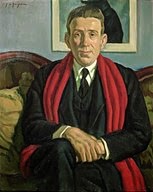

Partner Richard Chanlaire, Pierre Bernac
Queer Places:
2 Place des Saussaies, 75008 Paris, France
Lycée Condorcet, 8 Rue du Havre, 75009 Paris, Francia
Le Grande Coteau, Chemin Francis Poulenc, 37210 Noizay, Francia
5 Rue de Médicis, 75006 Paris, France
Père Lachaise Cemetery, 16 Rue du Repos, 75020 Paris, Francia
 Francis
Jean Marcel Poulenc (7 January 1899 – 30 January 1963) was a French
composer and pianist. His compositions include
mélodies,
solo piano works, chamber music, choral pieces, operas, ballets, and
orchestral concert music. Among the best-known are the piano suite
Trois mouvements perpétuels (1919), the ballet
Les
biches (1923), the
Concert champêtre (1928) for
harpsichord and orchestra, the
Organ Concerto (1938), the opera
Dialogues des Carmélites (1957), and the
Gloria (1959) for
soprano,
choir and orchestra. Poulenc's songs found their admirable interpreter in his
companion, Pierre Bernac.
Francis
Jean Marcel Poulenc (7 January 1899 – 30 January 1963) was a French
composer and pianist. His compositions include
mélodies,
solo piano works, chamber music, choral pieces, operas, ballets, and
orchestral concert music. Among the best-known are the piano suite
Trois mouvements perpétuels (1919), the ballet
Les
biches (1923), the
Concert champêtre (1928) for
harpsichord and orchestra, the
Organ Concerto (1938), the opera
Dialogues des Carmélites (1957), and the
Gloria (1959) for
soprano,
choir and orchestra. Poulenc's songs found their admirable interpreter in his
companion, Pierre Bernac.
As the only son of a prosperous manufacturer Poulenc was expected to follow his father into the family firm, and he was not allowed to enrol at a music college. Largely self-educated musically, he studied with the pianist Ricardo Viñes, who became his mentor after the composer's parents died. Poulenc soon came under the influence of Erik Satie, under whose tutelage he became one of a group of young composers known collectively as Les Six. In his early works Poulenc became known for his high spirits and irreverence. During the 1930s a much more serious side to his nature emerged, particularly in the religious music he composed from 1936 onwards, which he alternated with his more light-hearted works.
In addition to composing, Poulenc was an accomplished pianist. He was particularly celebrated for his performing partnerships with the baritone Pierre Bernac (who also advised him in vocal writing) and the soprano Denise Duval, touring in Europe and America with each, and making many recordings. He was among the first composers to see the importance of the gramophone, and he recorded extensively from 1928 onwards.
In his later years, and for decades after his death, Poulenc had a reputation, particularly in his native country, as a humorous, lightweight composer, and his religious music was often overlooked. During the 21st century more attention has been given to his serious works, with many new productions of Dialogues des Carmélites and La voix humaine worldwide, and numerous live and recorded performances of his songs and choral music.

Francis Poulenc by Jean de Gaigneron
The biographer Richard D. E. Burton comments that, in the late 1920s, Poulenc might have seemed to be in an enviable position: professionally successful and independently well-off, having inherited a substantial fortune from his father.[56] He bought a large country house, Le Grande Coteau, at Noizay, Indre-et-Loire, 140 miles (230 km) south-west of Paris, where he retreated to compose in peaceful surroundings.[56] Yet he was troubled, struggling to come to terms with his sexuality, which was predominantly homosexual. His first serious affair was with the painter Richard Chanlaire, to whom he sent a copy of the Concert champêtre score inscribed, "You have changed my life, you are the sunshine of my thirty years, a reason for living and working".[57] Nevertheless, while this affair was in progress Poulenc proposed marriage to his friend Raymonde Linossier. As she was not only well aware of his homosexuality but was also romantically attached elsewhere, she refused him, and their relationship became strained.[58][59] He suffered the first of many periods of depression, which affected his ability to compose, and he was devastated in January 1930 when Linossier died suddenly at the age of 32. On her death he wrote, "All my youth departs with her, all that part of my life that belonged only to her. I sob ... I am now twenty years older".[58] His affair with Chanlaire petered out in 1931, though they remained lifelong friends.[60]
On 30 January 1963, at his flat opposite the Jardin du Luxembourg, Poulenc suffered a fatal heart attack. His funeral was at the nearby church of Saint-Sulpice. In compliance with his wishes, none of his music was performed; Marcel Dupré played works by Bach on the grand organ of the church.[67] Poulenc was buried at Père Lachaise Cemetery, alongside his family.[108][114]
My published books: